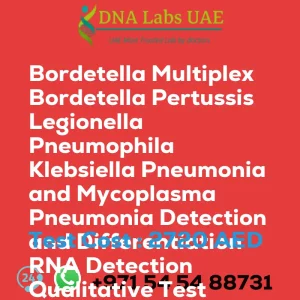Streptococcus Mutans Bacterial Load Test – Cost AED 1700.0
At DNA Labs UAE, we offer the Streptococcus Mutans Bacterial Load Test to measure the amount of Streptococcus mutans bacteria present in the oral cavity. Streptococcus mutans is a type of bacteria commonly associated with dental caries and other oral health problems.
Test Details
The Streptococcus Mutans Bacterial Load Test is performed by collecting a sample of dental plaque or saliva from the patient’s mouth. The sample is then cultured in our laboratory using Real Time PCR method, allowing the Streptococcus mutans bacteria to grow. After a certain period of incubation, the number of bacterial colonies present in the sample is counted.
Components
- Test Name: Streptococcus Mutans Bacterial Load Test
- Price: 1700.0 AED
- Sample Condition: Saliva and dental plaque
- Report Delivery: 4th Working Day Email (48 hours) / On phone (36 hours)
- Method: Real Time PCR
- Test Type: Viral
- Doctor: Physician
- Test Department: Genetics
Pre Test Information
Prior to the test, patients are required to sign a Consent document and bring any clinical history related to Streptococcus Mutans bacterial load.
Importance of the Test
The Streptococcus Mutans Bacterial Load Test provides valuable information about the patient’s oral health status and their risk for developing dental caries. It helps dentists and oral health professionals determine the appropriate treatment plan and preventive measures for the patient.
For instance, if the bacterial load is high, it may indicate a need for more aggressive oral hygiene practices or the use of antimicrobial agents. Regular monitoring of the Streptococcus mutans bacterial load can also be used to assess the effectiveness of treatment interventions and preventive strategies.
By comparing the bacterial load before and after treatment, healthcare providers can determine if the treatment has successfully reduced the bacterial population. Overall, the Streptococcus Mutans Bacterial Load Test is a useful tool in assessing oral health and guiding treatment decisions. It helps in identifying individuals who are at a higher risk for dental caries and allows for targeted interventions to prevent oral health problems.
| Test Name | Streptococcus Mutans bacterial Load Test |
|---|---|
| Components | |
| Price | 1700.0 AED |
| Sample Condition | Saliva and dental plaque |
| Report Delivery | 4th Working Day Email : 48 hours.On phone : 36 hours |
| Method | Real Time PCR |
| Test type | Viral |
| Doctor | Physician |
| Test Department: | Genetics |
| Pre Test Information | Need to sign Consent document and bring any clinical history of patient forStreptococcus Mutans bacterial LoadTest |
| Test Details |
The Streptococcus mutans bacterial load test is a diagnostic test used to measure the amount of Streptococcus mutans bacteria present in the oral cavity. Streptococcus mutans is a type of bacteria that is commonly associated with dental caries (tooth decay) and other oral health problems. The test is typically performed by collecting a sample of dental plaque or saliva from the patient’s mouth. The sample is then cultured in a laboratory to allow the Streptococcus mutans bacteria to grow. After a certain period of incubation, the number of bacterial colonies present in the sample is counted. The bacterial load test provides valuable information about the patient’s oral health status and their risk for developing dental caries. It can help dentists and oral health professionals determine the appropriate treatment plan and preventive measures for the patient. For example, if the bacterial load is high, it may indicate a need for more aggressive oral hygiene practices or the use of antimicrobial agents. Regular monitoring of the Streptococcus mutans bacterial load can also be used to assess the effectiveness of treatment interventions and preventive strategies. By comparing the bacterial load before and after treatment, healthcare providers can determine if the treatment has successfully reduced the bacterial population. Overall, the Streptococcus mutans bacterial load test is a useful tool in assessing oral health and guiding treatment decisions. It helps in identifying individuals who are at a higher risk for dental caries and allows for targeted interventions to prevent oral health problems. |








